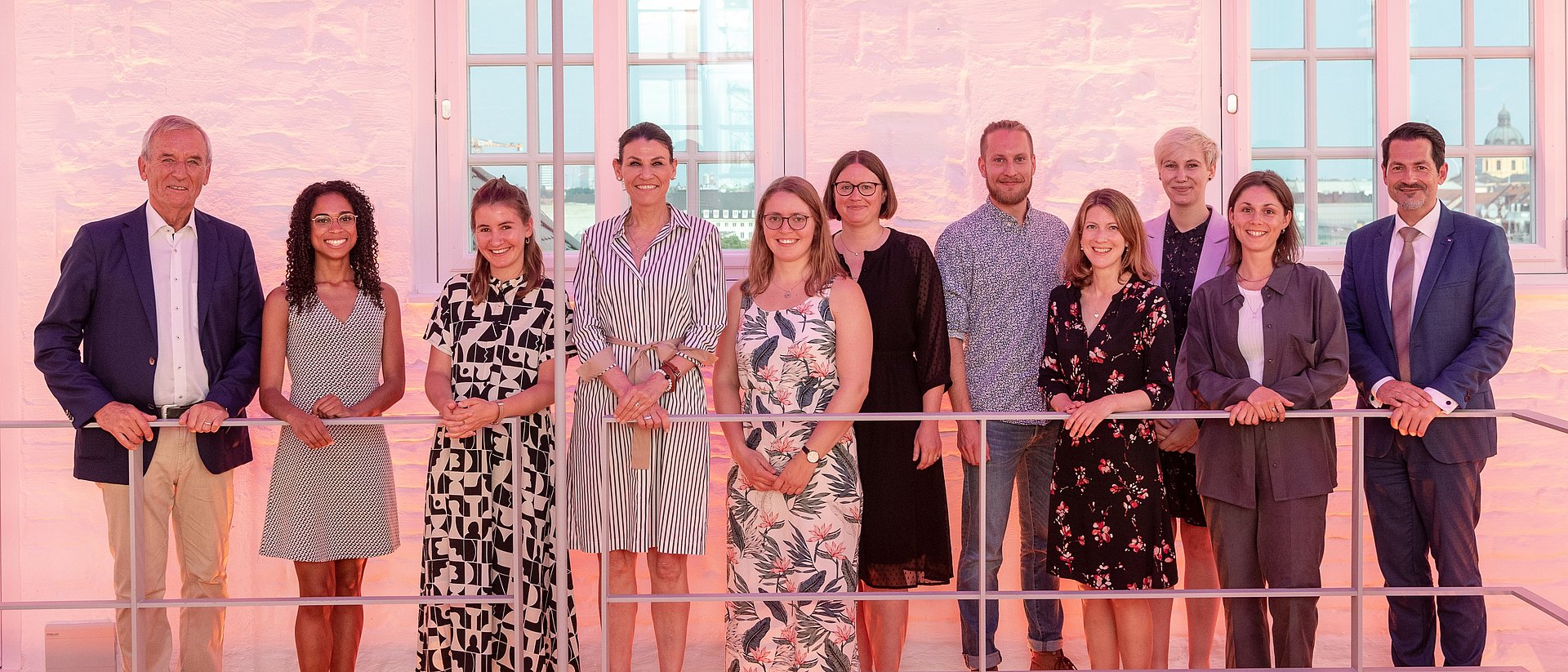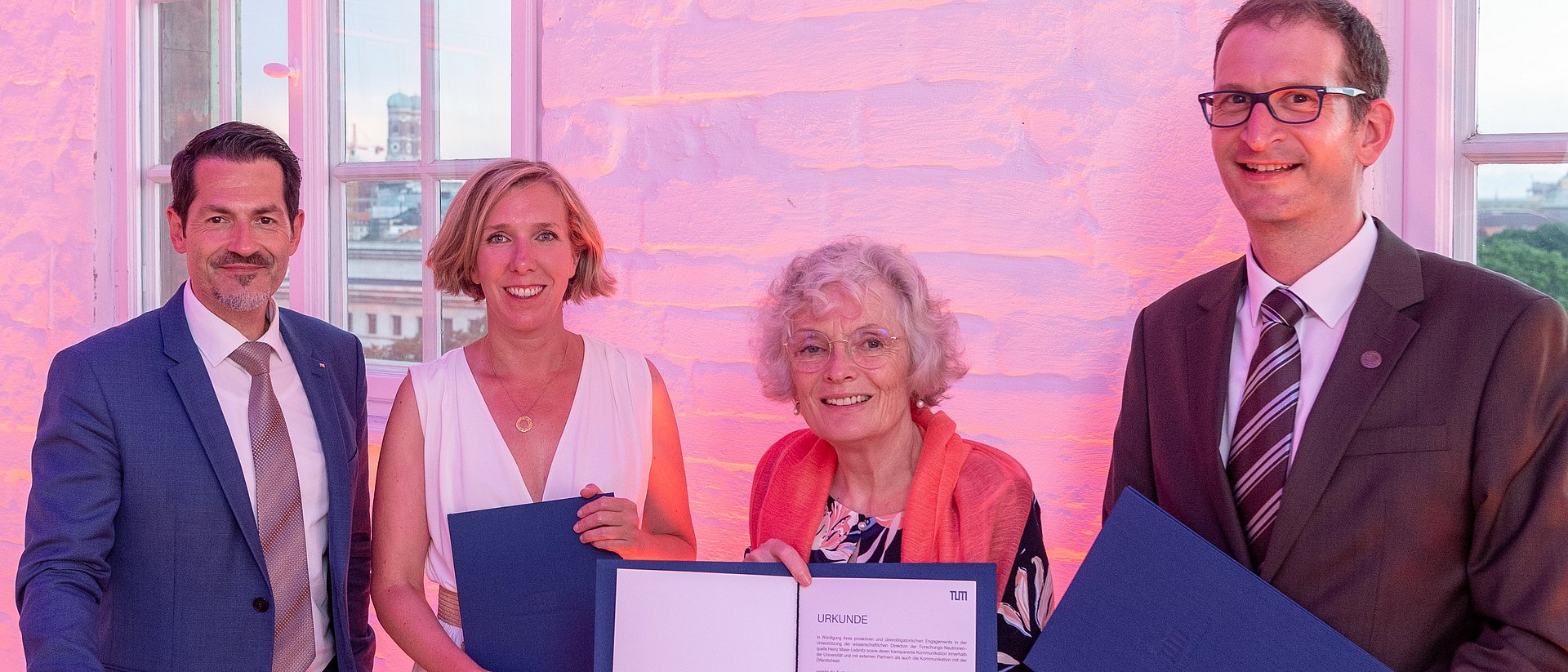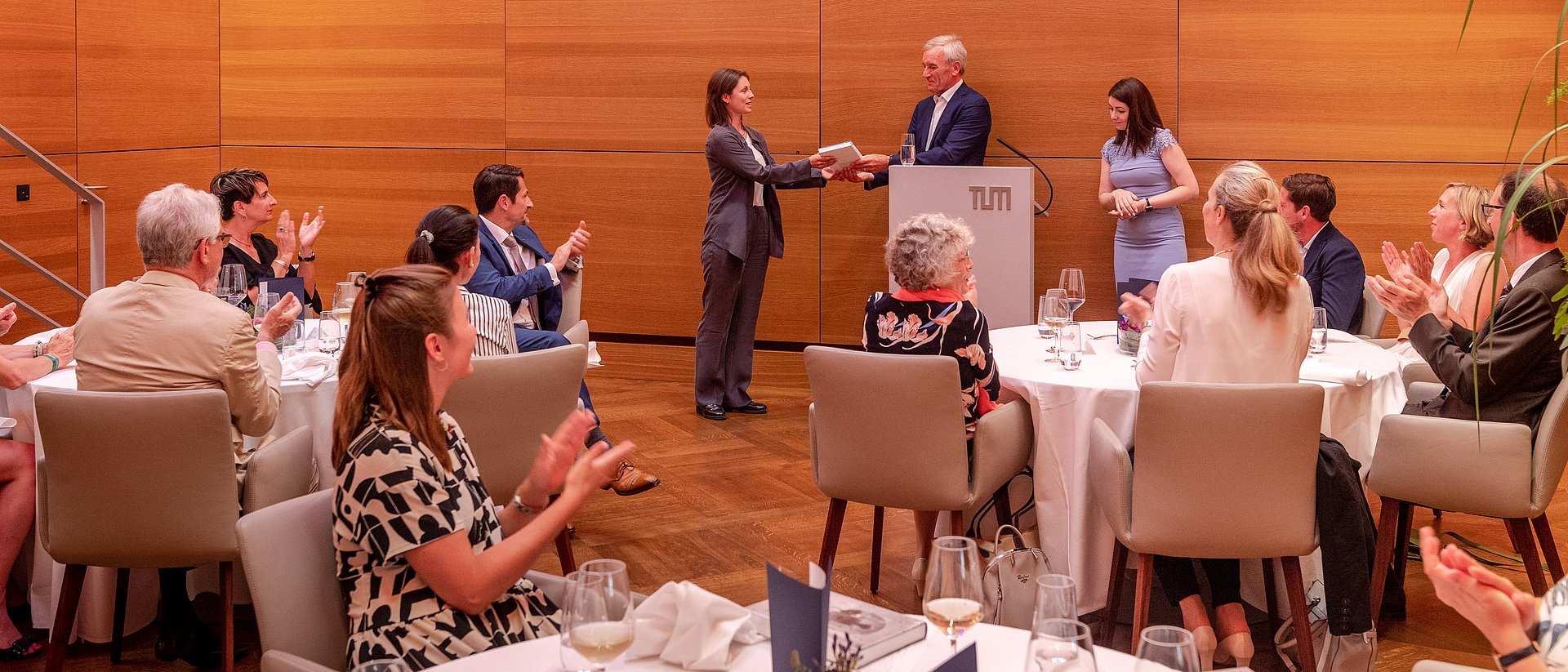Honors go to TUM employees and talented young researchers
The Karl Max von Bauernfeind Medal and Ortner Foundation prizes

Elisabeth Jörg-Müller, who works in the scientific headquarters of the research neutron source reactor FRM II, received The Karl Max von Bauernfeind Medal for her efforts on behalf of neutron research and for transparent communication.
Dr. Kathrin Dressel from the TUM Center for Study and Teaching was honored for her clever and efficient support for teaching programs at TUM during the Corona pandemic and for her work in organizing test and vaccination services that have enabled the resumption of face-to-face teaching.
In addition, Dr. Andreas Bauer from the TUM Center 6 Health, Safety, Radiation Protection was recognized for his commitment during the Corona pandemic. His outstanding efforts in organizing contact tracing as well as test and vaccination services were an important contribution to the return of research and teaching to the campus.
Dr. Markus Wächter received an award in his capacity as TUM Asia Managing Director. He has headed TUM's only foreign campus since 2006 and has done much to ensure the success of the campus and the visibility of TUM in Asia.

Ortner Foundation awards
The Johannes B. Ortner Foundation presented a total of 14 awards to outstanding talented young researchers in the classes of 2020 and 2021. The research projects are primarily Master's theses, doctoral dissertations and post-doctoral lecture qualifications. Below is a summary of the winners in alphabetical order per year:
2021 Award Winners
Jacqueline Adelowo, M.Sc. "Bid-based Derivation of Marginal Costs in Auction Markets"
Adelowo's excellently researched work combines theoretical concepts with a robust empirical analysis of computer-based market power monitoring – a subject of constantly increasing relevance in competitive policies. Her results generate clear recommendations for action which can add to efficiency improvements in regulatory practice.
Anna-Maria Mayerhofer, M.Sc. "Beiläufige Komplexitäten. Neun Projekte junger Münchner Architekturbüros" (Casual Complexities. Nine Projects by Young Munich Architectural Firms)
This outstanding theoretical written work, of extreme relevance to architectural discourse, investigates the underlying architectonic attitudes of young architects as well as the impact of construction law, economic and ecological conditions on the appearance of finished buildings.
PD Dr. med. Daniela Paepke "Integrative Medizin in der gynäkologischen Onkologie – Eine Bedarfserhebung der Gründung des Zentrums für Integrative Gynäkologie und Geburtshilfe" (Integrative Medicine in Gynecological Oncology – A Survey of Demand for the Founding of the Center for Integrative Gynecology and Obstetrics)
Cancer patients often want Integrative Medicine to complement their oncological therapies. Paepke has for the first time addressed this patient-centered topic in analytical-scientific terms, conducting several studies on the subject in the MRI gynecological hospital and authoring numerous peer-reviewed papers.
Fabian Sauter, M.Sc. "Konkurrenz entlang von Produktivitätsgradienten – Eine Fallstudie mit der seltenen Ackerwildkrautart" (Competition Components along Productivity Gradients – A Case Study with a Rare Type of Wild Herb (Ackerwildkraut))
Agrobiodiversity has declined sharply, while the mechanisms of the decline are still not adequately understood. This is the paper's point of departure; the work is based on an original experimental design, extensive data and substantive evaluations.
Friederike Schneider, M.Sc. "TUTTI. Ein Flussbad an der Isar" (TUTTI. A Bathing Area in the Isar River)
In her Master's thesis the author succeeds in providing an architectonic response to the question of how a bathing area located centrally in inner-city Munich might look. The work is convincing at all levels, independent and well-expressed.
Hannah Schwedhelm, M.Sc. "Bewertung der ökologischen Mindestwasserabflüsse in der Region Tirol" (Evaluation of the Ecological Minimum Water Runoffs in the Tyrol Region)
Schwedhelm successfully transfers an innovative method for determining residual flows to the Alpine region and enhances the associated data collection using drones and computer simulations. The forward-looking work takes hydrology, morphology and climate into account in a dynamic residual flow regime and shows how hydropower and intact running-water ecosystems can be reconciled.
Dr. Caren Wanzke "Development of Dissipative Supramolecular Materials – From Concept to Application"
The higher-level objective in Wanzke's work is to use the self-organization of molecules to create new materials with unique properties. She concentrates on systems suitable for the transport and discharge of medicinally active ingredients. The result comprises emulsions with adjustable active ingredient discharge speeds.
Maximilian Winderl, M.Sc. "Multiobjective Optimization of Irrigation Scheduling Based on MIKE SHE"
Winderl has developed a novel approach to optimizing irrigation scheduling. The relevance of the topic, the high degree of innovation involved in the paper as well as the quality of the formulation earn the work particular recognition.

2020 Award Winners
Dr. Friederike Adams "From Michael-type systems to biobased lactones: Designing novel polymer microstructures with modified bis(phenolate)lanthanides
Adams' work enables the catalytic synthesis of polymers which feature as yet inaccessible properties. For example it was possible to use these lanthanide complexes to produce a poly(3-hydroxybutyrate) with an innovative block micro-structure and which can be considered a biologically degradable alternative to conventional packaging materials.
Bettina Chocholaty "BEM-FEM Kopplung für die Analyse der Boden-Bauwerk-Interaktion im Zeitbereich" (BEM-FEM Coupling for the Analysis of Ground-Structure Interaction within a Particular Time Range")
This work does an outstanding job of achieving the objective of implementing a highly complex methodology of seismic ground-structure interaction in an optimized tool. The scientifically-based forecast of complex transient oscillation responses under time-variable loads for ground-anchored structures has a remarkable potential for supporting the transfer of research in the field of 'earthquake-safe construction'.
Dr. med. Veronika Dill "Aufhebung erworbener Apoptoseresistenz als therapeutischer Ansatz für Patienten mit Myelodysplastischen Syndromen (MDS) und Patienten mit sekundärer akuter myeloischer Leukämie (sAML)" (Counteracting Apoptosis Resistance as a Therapeutic Approach for Patients with Myelodysplastic Syndromes (MDS) and Patients with Secondary Acute Myeloid Leukemia (sAML))
Myelodysplastic syndromes are stem cell diseases affecting an increasing number of elderly patients in particular. Using a translational approach in her research, Dill succeeds in positioning the selective BCL2 inhibitor venetoclax as a treatment option for high-risk MDS and sAML patients. This is a remarkable step forward in the future treatment of this patient group.
Laura Eberhardt, M.A. "Hospitium – Beherbergung Sterbender" (Hospice – Housing the Terminally Ill)
The paper uses architectonic means to formulate an exact answer to the question of appropriate accommodations for the terminally ill. The work is characterized by the profound investigation of its topic and a painstakingly created architecture, whose qualities are equally distributed among spatial-organizational structure, sensual-perceptible materialization and the choice of location in an urban context.
Dr. Rebecca Preller "The Entrepreneurial Team Journey: Collectively Exploring the Venture’s Future"
In her doctoral dissertation, Preller processes fascinating questions relating to the topic complex of the founder team. The work is impressive due to the relevance of its research questions, its interesting findings and an exceptional methodological skill. The dissertation is worthy of the highest international levels.
Kristina Witzgall, M.Sc. "Wechselseitige Interaktionen zwischen Pflanzenresten, Mikroorganismen und Boden beim Aufbau von organischer Bodensubstanz" (Mutual Interactions between Plant Remains, Microorganisms and Soil in the Formation of Organic Soil Material)
Witzgall's scientific approach renders an excellent combination of soil chemistry, microbiology and imaging techniques in the investigation of the relationship between soil structure and the formation of various soil carbon pools. The work is an essential contribution to the analysis of carbon storage in soils in today's era of climate change.
The Karl Max von Bauernfeind Medal is named after the founding director of TUM's predecessor, the Royal Bavarian Polytechnic School Munich. The Medal was first awarded in 1997.
The former "Senator" Johannes B. Ortner, who passed away in 2022, provided the foundation bearing his name with a highly generous endowment. Since 2006 the Foundation has awarded TUM with prizes in support of outstanding young researchers and in addition provides regular support for cultural events at the university.
Technical University of Munich
Corporate Communications Center
- Ulrich Meyer
- presse@tum.de
- Teamwebsite